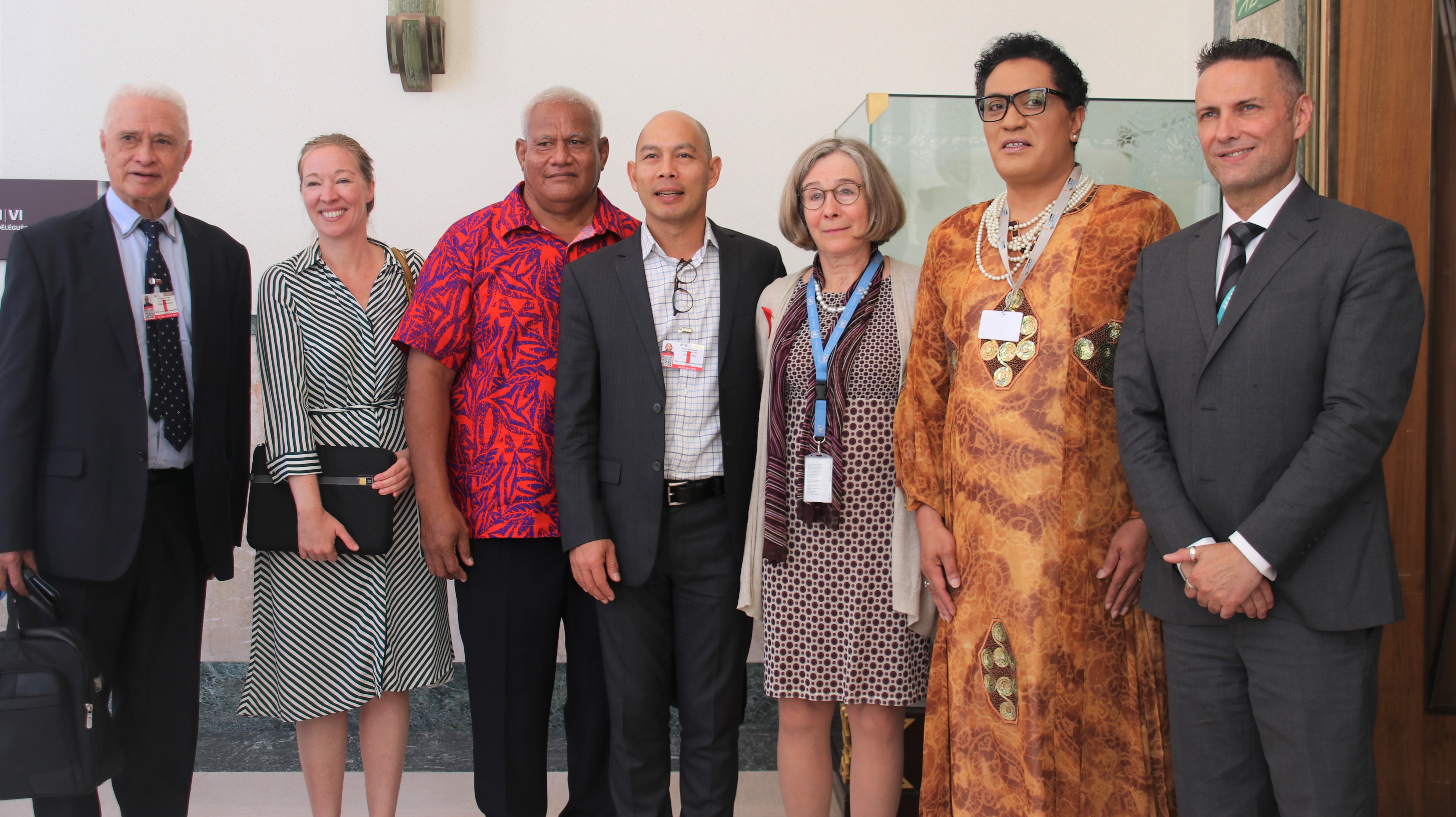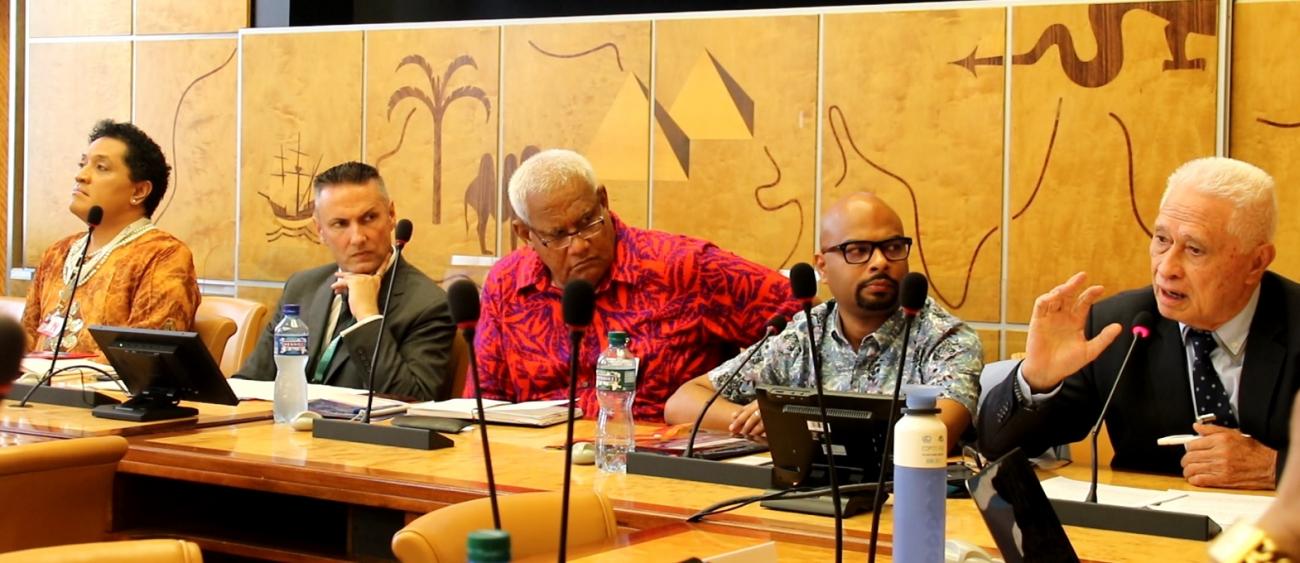Demystifying human rights through the exploration of Pacific culture and values
Fairness, equality, protection of the most vulnerable, dignity, respect and participation. While there are some who instinctively see human rights as a foreign concept, these values have been embedded in the social fabric of Pacific societies for generations.
By communicating human rights terms using cultural values, traditional stories, proverbs and religious faiths– as opposed to technical legalese – human rights advocates are finding greater understanding and support amongst Pacific audiences.
This was the highlight of a panel discussion in Geneva during a Pacific side event at the 41st session of the Human Rights Council at the Palais De Nations on 25 June 2019. The event, focused on ‘Overcoming Global Implementation Challenges’, was organised by the UK-funded Pacific Commonwealth Equality Project implemented by SPC’s Regional Rights Resource Team (SPC RRRT).
One of the first of its kind to be hosted in Geneva, the side event was attended by some 50 participants and featured: Mr Maiava Iulai Toma, the Ombudsman of Samoa; Mr Sa’aga Teafa, the Ombudsman of Tuvalu; Mr Ashwin Raj, the Director of the Fiji Human Rights and Anti-Discrimination Commission; Ms Joey Joleen Mataele, the Director of the Tonga Leiti’s Association; and Mr Francesco Motta, Chief of the Asia-Pacific, Middle East and North Africa Branch, Office of the High Commissioner for Human Rights.
Mr Miles Young, Director of RRRT, who moderated the discussion noted that: “A key issue for those working in the human rights space in the Pacific is the perception that human rights is a foreign concept which is not aligned with Pacific cultural values and ways of life.”
He paid tribute to the effectiveness of a contextualised approach in addressing these misperceptions through explaining human rights standards using traditional concepts, stories and folklore, but without compromising accepted human rights standards.
Mr Maiava Iulai Toma stated that for a long time human rights have been misunderstood and misinterpreted in his country, however, basic values central to human rights are also central to the principles of Fa’samoa (Samoan way of life) and that the two reinforce each other.
“It is no surprise that the relationship between human rights and Fa'asamoa can be mutually binding given they are both rooted in the dignity of the person, love, equality, and respect,” he explained.
Mr Toma shared that one of the first tasks undertaken by the Samoa National Human Rights Institution (NHRI) was to address the misperception in the minds and attitudes of the Samoan people about human rights being a foreign concept.
“During the ratification of CRC and CEDAW in Samoa, there was great confusion and the actors of human rights met with great opposition. So we saw that one of the first priority for us as an NHRI was to do something about this confusion, to try to go back and change the attitudes which had set itself in the minds of Samoan people that human rights is a foreign concept that the UN was trying to shove down our throats.
“We felt that it was highly necessary to put human rights in the Samoan context for the Samoan minds alongside their cultural and faith beliefs,” Mr Toma said.
Mr Toma said when human rights and Fa’samoa are brought together there is the chance of convincing the community and faith leaders on how they merge and reinforce each other.
He referred to the many old cultural Samoan sayings (idioms) which highlight the principles of fundamental human rights and therefore reflect the extent to which Pacific cultures are related to human rights values.
Ms Joey Mataele reiterated the sentiments of the Samoan Ombudsman and stressed the need for Pacific people to see human rights within the regional and national context.
“Human rights is not a foreign word or concept, we were born with it, and we need to train our Pacific people in our way, because we in the Pacific know how to deliver and deal with the persistence and challenges in our ways, our own Pacific context,” she said.
She added that it was essential for Pacific people to re-educate themselves on their faith and then see just how much faith and cultural values support human rights principles and gender equality.
Her Excellency, Ms Veronica Bard, the Swedish Ambassador to the United Nations in Geneva, commended the Pacific panellists for the presentation, especially for making use of human rights in a different context in order to communicate it to communities and to the world.
“I am very impressed with what you have done, you (Pacific) are such good role models for dealing with what the true sense of human rights is, you have set an example to the world on how to communicate human rights and this panel discussion has been a very unique opportunity,” she added.
Ms June Oscar, the Aboriginal and Torres Strait Islander Commissioner of the Australian Human Rights Commission, echoed the sentiments of Ambassador Bard and said that a contextualised approach made human rights more accessible and easier to understand for the public.
The side event was also supported by the governments of Australia and Sweden, the Asia Pacific Forum, Global Alliance of National Human Rights Institutions, Office of the High Commissioner for Human Rights (OHCHR) and the Permanent Mission of Fiji in Geneva.

